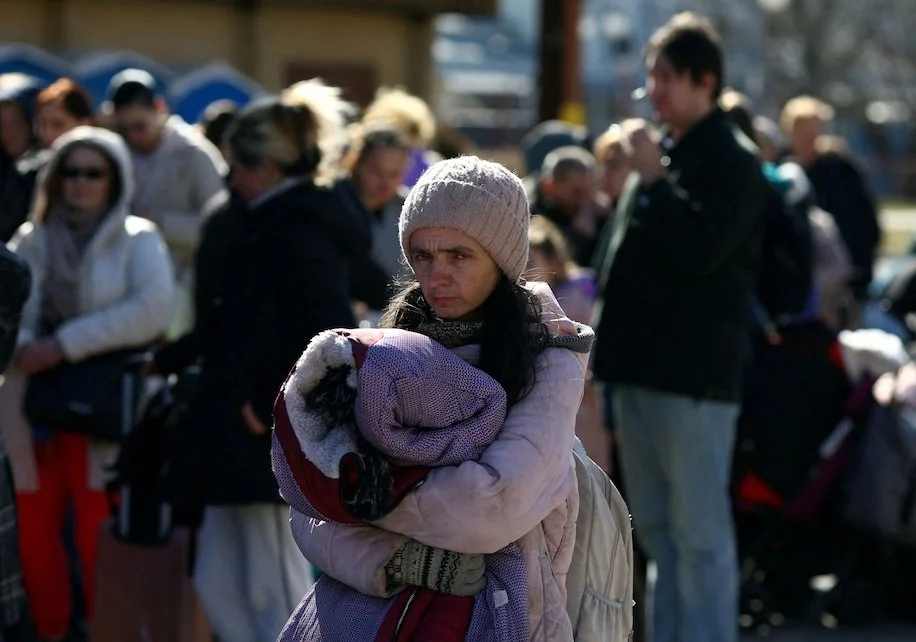Europe’s Handling of the Ukrainian Refugee Crisis Raises Important Questions of Equity
A group of Ukrainian refugees enters Poland, the most common destination for those fleeing the country. Source: (REUTERS/Hannah McKay)
Nearly 10 million people have been displaced from their homes in Ukraine as a result of the Russian invasion on February 24. Within the first week of the invasion, the European Union (EU) issued an emergency plan waiving visa requirements and allowing Ukrainian refugees the right to live and work in any of its 27 member nations for up to 3 years. Refugees will also enjoy access to social services such as healthcare, housing, and education. Furthermore, many European firms have expedited hiring processes for Ukrainian refugees, and some even offer benefits such as child care services.
Notably, the EU’s program for refugees does not include non-Ukrainians who were living in the country during the invasion. Indeed, it is hard to ignore the contrast between Europe’s treatment of European refugees and those coming from locations in the Middle East and North Africa. While 4 million Ukrainians are seeking refuge currently, 84 million people worldwide were seeking resettlement as a result of war, human-rights violations, and other similar causes in 2021. The vast majority of these refugees have not enjoyed the same expedited visa and hiring processes that the Ukrainians have. One reporter, Sally Hayden, has documented how the EU has actively contributed to the suffering of migrants attempting to travel from North Africa to the European continent, largely through funding Libya’s government to intercept refugees making the harrowing journey across the Mediterranean Sea.
The superior treatment of Ukrainian refugees is most likely due to a multitude of factors, the first one being the most obvious: EU citizens are better able to empathize with Ukrainians due to racial, linguistic, and religious ties according to research from Lamis Abdelaaty, an assistant professor of political science at the Maxwell School of Syracuse University. Furthermore, in countries like neighboring Poland, where nearly 1 million Ukrainians lived prior to the war, a kinship with Ukraine has already existed for decades. It is no coincidence, then, that Poland has admitted over 2 million Ukrainian refugees already, the most by any country in the world.
Abdelaaty also argues that anti-Russian sentiment among Europeans is helping Ukrainian refugees find homes and jobs. Her research demonstrates that states do more for refugees seeking protection from a shared rival actor. Allowing refugees to enter EU member-states affords the bloc the ability to signal their loyalty to the cause without sending in troops to Ukraine or advocating for the controversial no-fly zone that Ukrainian President Volodymyr Zelenskyy so desperately wants.
In addition to distinctions between Ukrainian refugees and those from other areas, there also exists a nuance in the treatment of national and ethnic groups among the people fleeing Ukraine. There have been reports of Black people being denied exit and entry at border crossings in addition to Black women and children being excluded from a Ukrainian policy that allows these groups to exit the country first. While Ukrainian officials have denied these claims, they have been sufficient to earn a condemnation of the treatment of Africans fleeing the country from the African Union. Additionally, the High Commissioner of the UN Refugee Agency (UNHCR) recently spoke out against the “disturbing incidents of discrimination, violence, and racism” at Ukrainian border crossing locations.
Another element of note in addition to general differences between the handling of broad refugee populations and individual acts of discrimination toward specific groups within the Ukrainian refugee population is a disturbingly common media narrative that expresses shock that such a conflict could occur in Europe. One CBS News segment went viral when senior foreign correspondent Charlie D’Agata described Ukraine as a place that “isn’t… with all due respect, like Iraq or Afghanistan, that has seen conflict raging for decades. This is a relatively civilized, relatively European - I have to choose those words carefully, too - city, where you wouldn’t expect that or hope that it’s going to happen.” D’Agata later issued an apology, but his statement was just one of many that portrayed similar sentiments. Bulgarian Prime Minister Kiril Petkov stated, “these are not the refugees we are used to. These are people who are Europeans, so we and all other EU countries are ready to welcome them. These are… intelligent people, educated people… So none of the European countries is afraid from the immigrant wave that is about to come.”
While disappointing, this way of thinking and reporting is nothing new according to Denijal Jegic, a postdoctoral researcher in communication and multimedia journalism at Lebanese American University in Beirut. There has always been an implicit understanding “that war is a natural phenomenon in places outside of the Euro-American sphere, and the Middle East in particular, and that war would take place because of a lack of civilization, rather than due to unjust geopolitical power distribution or foreign intervention,” he said in an interview.
While the outpouring of support for Ukrainian refugees from European neighbors is a beacon of light in a dark time for the country, it is important that nations consider the broader context for asylum-seekers globally. Sally Hayden closes her book, My Fourth Time, We Drowned: Seeking Refuge on the World’s Deadliest Migration Route, about the grave struggles of migrants making the journey from Libya to Southern Europe, with a question that readers should keep in mind during this newest refugee crisis: “How can we avoid growing immune to inequality across the world and make sure we are hearing pleas for help?”

